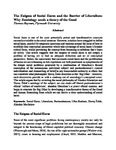The Enigma of Social Harm and the Barrier of Liberalism: Why Zemiology needs a theory of the Good
| dc.contributor.author | Raymen, TW | en |
| dc.date.accessioned | 2018-09-21T11:59:25Z | |
| dc.date.issued | 2019-03 | en |
| dc.identifier.issn | 2398-2764 | en |
| dc.identifier.uri | http://hdl.handle.net/10026.1/12408 | |
| dc.description.abstract |
Social harm is one of the most potentially potent and transformative concepts currently available to the social sciences. However, scholars have struggled to define social harm, puzzled by enigmatic questions and tensions around the issue of how to establish clear conceptual parameters which take advantage of social harm’s broader critical focus, whilst preventing the concept from becoming so nebulous that it loses all utility. This article suggests that the enigma of social harm is not simply a problem of having yet to find an adequate definition and set of conceptual parameters. Rather, the uncertainty that surrounds social harm and the proliferation of harms we are witnessing in late-capitalism are both positioned as symptomatic of far deeper social problems generated by a combination of liberalism’s flawed conception of the autonomous individual subject and postmodernism’s cynical individualism and dismantling of belief in any transcendent authority or ethics that can constitute what philosopher Slavoj Žižek describes as the ‘Big Other’. However, such discoveries provide us with a roadmap out of zemiology’s conceptual crisis. This article argues that by revisiting the moral philosophy of Alasdair Macintyre and Slavoj Žižek’s ontology of the subject, we can shake-off liberal-postmodernism’s ethical ‘culture of emotivism’, abandon liberalism’s a priori ethical maxims, and begin to reinstate the Big Other by developing a transformative theory of the Good and human flourishing from which we can derive a clear understanding of social harm. | en |
| dc.format.extent | 134 - 163 | en |
| dc.language.iso | en | en |
| dc.rights | Attribution-NonCommercial-NoDerivatives 4.0 International | en |
| dc.rights | Attribution-NonCommercial-NoDerivatives 4.0 International | en |
| dc.rights | Attribution-NonCommercial-NoDerivatives 4.0 International | en |
| dc.rights | Attribution-NonCommercial-NoDerivatives 4.0 International | en |
| dc.rights | Attribution-NonCommercial-NoDerivatives 4.0 International | en |
| dc.rights | Attribution-NonCommercial-NoDerivatives 4.0 International | en |
| dc.rights | Attribution-NonCommercial-NoDerivatives 4.0 International | en |
| dc.rights.uri | http://creativecommons.org/licenses/by-nc-nd/4.0/ | en |
| dc.rights.uri | http://creativecommons.org/licenses/by-nc-nd/4.0/ | en |
| dc.rights.uri | http://creativecommons.org/licenses/by-nc-nd/4.0/ | en |
| dc.rights.uri | http://creativecommons.org/licenses/by-nc-nd/4.0/ | en |
| dc.rights.uri | http://creativecommons.org/licenses/by-nc-nd/4.0/ | en |
| dc.rights.uri | http://creativecommons.org/licenses/by-nc-nd/4.0/ | en |
| dc.rights.uri | http://creativecommons.org/licenses/by-nc-nd/4.0/ | en |
| dc.subject | Zemiology | en |
| dc.subject | Ethics | en |
| dc.subject | Social harm | en |
| dc.subject | Liberalism | en |
| dc.subject | Postmodernism | en |
| dc.subject | Ultra-realism | en |
| dc.subject | Slavoj Žižek | en |
| dc.title | The Enigma of Social Harm and the Barrier of Liberalism: Why Zemiology needs a theory of the Good | en |
| dc.type | Journal Article | |
| plymouth.issue | 1 | en |
| plymouth.volume | 3 | en |
| plymouth.journal | Justice, Power and Resistance | en |
| plymouth.organisational-group | /Plymouth | |
| plymouth.organisational-group | /Plymouth/Faculty of Arts, Humanities and Business | |
| plymouth.organisational-group | /Plymouth/Faculty of Arts, Humanities and Business/School of Law, Criminology and Government | |
| plymouth.organisational-group | /Plymouth/REF 2021 Researchers by UoA | |
| plymouth.organisational-group | /Plymouth/REF 2021 Researchers by UoA/UoA18 Law | |
| dcterms.dateAccepted | 2018-09-19 | en |
| dc.rights.embargodate | 2020-01-31 | en |
| dc.rights.embargoperiod | Not known | en |
| rioxxterms.licenseref.uri | http://creativecommons.org/licenses/by-nc-nd/4.0/ | en |
| rioxxterms.licenseref.startdate | 2019-03 | en |
| rioxxterms.type | Journal Article/Review | en |



